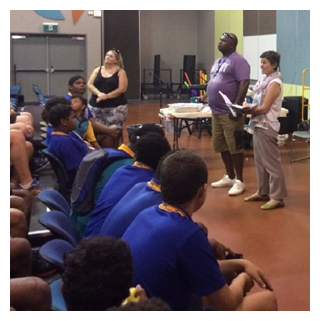UQ’s School of Public Health has worked with Women on Country (led by Minnie King) in remote Western Cape on a school and community research project for the past 8 years to reduce menstrual health challenges.
This is the first menstrual health teaching guide developed on Country and involving majority Indigenous students. It was important for the relevance and usefulness of this guide that it covers questions, topics and information derived directly from discussion with students. This ensures that the guide aligns and covers the information students from the Western Cape are wanting to know.


Our Indigenous-led menstrual health teaching guide: Free download
 Menstrual health can have a direct impact on a student’s academic performance, health, and quality of life. Students’ menstrual health ‘literacy’ (awareness and familiarity with information) can be insufficient to manage these challenges. There has been an increasing focus to improve students’ menstrual heath literacy by focusing on providing specific information through curriculum. Yet, teachers may find it challenging to address menstrual health, due to cultural norms and attitudes that underlies layers of complexity to this topic. In some cultures in may be considered ‘women’s business’, and often people don’t really want to speak about menstruation.
Menstrual health can have a direct impact on a student’s academic performance, health, and quality of life. Students’ menstrual health ‘literacy’ (awareness and familiarity with information) can be insufficient to manage these challenges. There has been an increasing focus to improve students’ menstrual heath literacy by focusing on providing specific information through curriculum. Yet, teachers may find it challenging to address menstrual health, due to cultural norms and attitudes that underlies layers of complexity to this topic. In some cultures in may be considered ‘women’s business’, and often people don’t really want to speak about menstruation.
Discussing health topics that have previously been taboos, such as menstrual health/periods, can be challenging for individuals. Engaging in open and honest conversations around menstrual health can help remove existing stigma and is essential to promoting the overall health and wellbeing of individuals and society.
This guide provides free educational support for teachers, students, and parents, in addition to the government resources in schools. The intended use of this guide is for all genders, from school years 3 to 12 (ages 7 to 18 years old) as well as the teachers and carers who support them. It is recommended to commence the guide from year 4, however it is up to each school’s discretion as to how and when the teaching guide will be used.
Download the free ‘Mind Your Body’ Indigenous-led menstrual health teaching guide
Cite as: Milsom, O.*, Ghavamjoo, M.*, Lansbury, N., Ratnapalan, R. and King, M. (2024), Mind Your Body: A student-centred teaching guide on menstrual health written by and for Queensland’s Indigenous and remote primary and secondary school students, The University of Queensland, Brisbane. (*note: Milsom and Ghavamjoo both contributed equally to this work and are co-first authors)
Minnie King is a Kaiwalagal, Umaii and Kiwai woman whose people extend from the Western Cape (Kie Daudai) to the Western Province (Migi Daudai) and she is also Motu-Koita. Minnie is a local community businesswoman in Weipa and a Senior Adjunct Lecturer with the University of Queensland‘s School of Public Health. She initiated and led this locally-focused, community-based research on menstrual health that paved the way to this teaching guide. Minnie was motivated by the powerful and positive cultural learnings from her mother and grandmother about menstruation and the juxtaposition when observing and listening to stories of menstrual challenges and inequalities in remote First Nations communities. Driven by the need to address colonial entrenched shame and stigma by defining and re-establishing menstruation as a biological process and basic human right that once had a place in cultural teachings by first nations people, Minnie reached out to Associate Professor Nina Lansbury at The University of Queensland to establish this Australian-first, remote community-based, student-led menstrual health collaboration in 2017.
Associate Professor Nina Lansbury is a non-Indigenous research and teaching academic in the School of Public Health at The University of Queensland. She undertakes research in areas of social inequity and environmental change with the hope that this provides the evidence for change to improve health and wellbeing for all. Her research mainly focuses on Indigenous peoples’ health in remote communities, and on climate change and its impact on human health.
Dr Reshma Ratnapalan is a casual academic in the School of Public Health at the University of Queensland and a resident medical doctor with Queensland Health. She has a keen interest in menstrual health and joined this project as a research assistant. Her long-term goal is to undertake General Practitioner training in rural Queensland with an aim to contribute towards reducing health inequities.
Olivia Milsom is an Honours student in Public Health at The University of Queensland. She is researching the health and wellbeing of remotely living Indigenous women, under the supervision of Minnie King and Nina Lansbury. Olivia is going on to join the Queensland Government as a graduate policy officer, where she hopes to continue to work and advocate for improved women’s health and menstrual education.
Masoumeh Ghavamjoo is a student undertaking a Bachelor of Health Sciences at The University of Queensland, specialising in public health. She joined this project as a UQ Winter Scholar. After graduation, Masoumeh plans to continue deepening her understanding of ‘health’ and contribute meaningfully to efforts aimed at promoting the health of diverse populations.
Western Cape schools, Queensland: The authors sincerely acknowledge the students, staff, principals, parents, caregivers and families from Western Cape College’s Weipa Campus, Mapoon Campus and Residential Campus; and St. Joseph’s Parish School, Weipa, for their willingness to participate and be involved in the development of this teaching guide. To the School Principals and Executives who allowed access to your schools, students and teachers year on year: your support has been instrumental in making this guide come to fruition, so a big thank you. To the parents and carers of the students that attended (99% uptake) across all schools and all years: a warm thank you for trusting in the importance of menstrual health education being delivered in a culturally safe and appropriate school environment. We would particularly like to provide a huge shout-out to all students from these schools whose open and honest contributions over a period of eight years provided the framework and substance from which this guide was developed. Your contributions and involvement have provided insightful feedback that has influenced the content of the teaching guide. This has ensured that this teaching guide’s content is a representation of the specific needs, challenges and knowledges sought after by Indigenous and non-Indigenous school students- emphasising the importance for menstrual health education that addresses students’ specific questions.
Embley Contracting, Weipa: The authors would like to acknowledge the invaluable contribution of Minnie King, Ronnie Bosuen and Embley Contracting, Weipa, for their initiation, commitment, support and cultural leadership for the conceptualisation, development and writing of this research project, including this teaching guide. Without their support, this work would not be possible.
School of Public Health at The University of Queensland, Brisbane: The School of Public Health is committed to working with Aboriginal and Torres Strait Islander people and communities to improve the prevention and management of infectious and chronic diseases, address discrimination, and expand access to health care. The work that the School undertakes in this space has been invited by Aboriginal and Torres Strait Islander community partners, who have sought a collaborative community-led approach. UQ’s public health researchers investigate access to reproductive health services and broader sexual and reproductive health needs for Aboriginal and Torres Strait Islander women. This includes menstrual health and hygiene, and access to sexual and reproductive health services and information. This approach and focus respond to the School’s mission to work together to improve the health and wellbeing of populations in a changing and inequitable world.
Lansbury, N. and M. King (2024). "The budget pledged $12.5 million for free menstrual products in Indigenous communities. Here’s why it’s needed." TheConversation.com, https://theconversation.com/the-budget-pledged-12-5-million-for-free-menstrual-products-in-indigenous-communities-heres-why-its-needed-230118 (accessed 28/5/24) May 21.
Armour, Mike, Barrington, Dani, Connolly, Helen, Goldblatt, Beth, Hill, Elizabeth, Howe, Danielle, Johnson, Margaret E., King, Minnie, Lansbury, Nina, Nash, Meredith , Steele, Linda, and Ussher, Jane M (2023). Menstrual justice: a human rights vision for Australia. Social Science Research Network, https://doi.org/10.2139/ssrn.4452668
Lansbury, N. and King, M. (2022), “Free period care products in Queensland schools is just a first step. Remote communities need access to these items as well”, TheConversation.com, July 4, https://theconversation.com/free-period-care-products-in-queensland-schools-is-just-a-first-step-remote-communities-need-access-to-these-items-as-well-185700 (2264 readers).
King, M. and Hall, N.L. (2021), ‘How can I help Mum at that time of the month? Boys’ voices on menstrual health in a remote Indigenous town’, The Leak, August 5, https://chalicefoundation.org/the-leak/
Hall, N.L. (2021), ‘It’s a fallacy… that it’s easy to manage your period’, The Leak, July 22, https://chalicefoundation.org/the-leak/
Hall, N.L., Creamer, S. and King, M. (2020), ‘Menstrual Hygiene Efforts to Provide Dignity for Girls and Women in Remote Australia’, Australian Outlook (Journal of the Australian Institute for International Affairs), March 8, http://www.internationalaffairs.org.au/australianoutlook/menstrual-hygiene-efforts-to-provide-dignity-for-girls-and-women-in-remote-australia/.
Lansbury, N.L. and King, M. (2021), ‘Lived experiences of menstrual health for Indigenous girls in a remote Australian town’, Health Care for Women International, 1-18. https://doi.org/10.1080/07399332.2021.1967955.
Krusz E, Hall N, Barrington D, Creamer S, Anders W, King M, et al. Menstrual health and hygiene among Indigenous Australian girls and women: barriers and opportunities. BMC Women's Health. 2019;19(146).
King, M., Hall, N.L., Wigginton, B. and Krusz, E. (2019), ‘Dignity Everyday: Exploring a women’s health issue with students of Western Cape, Queensland’, https://espace.library.uq.edu.au/view/UQ:d3bacb5, The University of Queensland, Brisbane and Women on Country, Weipa.
Hall, N. (2018), ‘Women and Girls in remote Indigenous Australian communities: Cultural, financial and knowledge barriers to Menstrual Hygiene Management, Australian Indigenous Health Bulletin, 18(2).
Hall, N., Huggett, C. and Iten, L. (2017). ‘Indigenous girls missing school during their periods: the state of hygiene in remote Australia’, The Conversation.com (4 July) (18235 readers)
Contact us
For more details, please contact:
Associate Professor Nina Lansbury
School of Public Health
The University of Queensland
